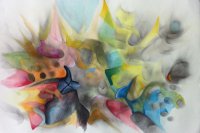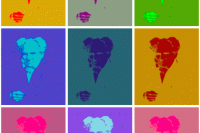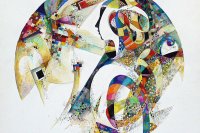“Self-education is, I firmly believe, the only kind of education there is.”
― Isaac Asimov
I was always an “outstanding” student. I earned top grades throughout my high school and university education, pulverized standardized tests, was a National Merit Scholar, and went to college on a cushy full-ride academic scholarship. I was diligent, clever, and dead-set on doing what was necessary to garner high marks, exceptional test scores, and accolades; I wanted the proverbial stickers and cookies. After all, those things were presented to me as definitive metrics of “success” (shady word, that one), and the more one collected, the closer one was to securing the ever-enviable “Bright Future”.

Rissa, Das Geheimnis, 1966. Photo Credit: Wiki Commons
By all counts, it would seem that I did exceedingly well, and in many ways, I did. I undoubtedly benefited from my drive to achieve what was dangled before my eyes. But in hindsight, there’s a giant, glaring problem with my educational experience: I hardly did any real thinking, and I didn’t really give a damn about learning. At least not for most of that time. For the vast majority of my “education”, I wasn’t asking deep, probing questions; I wasn’t generating original ideas about the topics at hand; I wasn’t engaging in creative problem-solving; I wasn’t imagining multiple perspectives or divergent possibilities; I wasn’t struggling to make sense of the world around me.
How is it possible that, during nearly 20 years in systems of education, I did such a relatively small amount of thinking? How can a student ace every class and be awarded scholarships for academic achievement, and all the while not really care about learning?
F**k Inquiry, Give Us Outcomes
One succinct, important answer is that most everything about my environment suggested that those things—thinking critically with my own faculties, creating and imagining new possibilities, learning for its own sake—were not valuable or necessary. That is not to say that I didn’t have a few extraordinary teachers along the way who encouraged genuine inquiry. I did, and they managed to squeeze some sincere effort out of me, but a few well-intentioned individuals cannot easily dismantle years of subtle conditioning.
From the early years of my education, I was surrounded by indicators that only one thing was truly essential in my educational pursuits: the attainment of high performance ratings (test scores & grades). Exemplary test scores and grades (largely based on test scores) resulted in praise, honors, “talented and gifted” distinctions. Conversely, poor marks were accompanied by a certain sternness, an impression of deficiency, “see me after class” notes. This stark dichotomy implicitly conveyed the paramount importance placed upon results, measurable outcomes. Forget process and everything else in between: the unmistakable message, signaled silently-yet-incessantly by my education system, was that what mattered was how one performed when it counted, when one was to be judged.
I suspect that many of you experienced this same situation. In fact I’m sure you did, because as you know, public schools in the US (as in many other countries) must adhere to an array of government regulations which include universal standardized testing, and most schools use the traditional A-to-F points-based grading system, with tests comprising the bulk of one’s grade. One Mordor-scale downside of this state of affairs is that it all but forces schools to emphasize only those things which can be quantified—objectively measured, empirically verified. It is notoriously difficult to devise fair assessments of critical thinking, creativity, imagination, curiosity, and the like, so we don’t, mostly (at least not until college), which in turn indicates to students that those things are not vital. This is a tragic miscommunication, considering that those qualities are indispensable to both an innovation-driven economy and (arguably) a fulfilling life.
Teacher as Almighty Pitcher, Student as Empty Receptacle
The format of standardized tests (and most exams for standard subjects) compels schools to focus on dispensing the type of knowledge information that translates seamlessly into multiple-choice examinations: i.e. pure fact (or perhaps more accurately: culturally influenced theories and interpretations presented as “pure fact”). This naturally creates a teacher-student dynamic in which the teacher (and perhaps the textbook) is viewed as the keeper of fact, the pitcher containing all that is valuable and necessary (everything the student must soon contain in order to succeed).
The student, in turn, is an empty receptacle—worthless on its own, with nothing to contribute, waiting patiently to be filled by the Almighty Pitcher of Facts. The student’s objective is to internalize as many facts as possible for the sole purpose of regurgitating them at the proper time when they will be assessed based on their regurgitation. “Knowledge”, in this dynamic, becomes something which has been verified, perfected, and non-negotiable by the time the learner encounters it, suggesting to the student that the authority figures already possess all of the answers. (‘We know everything. You just need to memorize it.’) In his influential book Pedagogy of the Oppressed, Paulo Freire espoused similar ideas:
“The teacher talks about reality as if it were motionless, static, compartmentalized, and predictable. Or else he expounds on a topic completely alien to the existential experience of the students. His task is to “fill” the students with the contents of his narration — contents which are detached from reality, disconnected from the totality that engendered them and could give them significance. Words are emptied of their concreteness and become a hollow, alienated, and alienating verbosity.
The outstanding characteristic of this narrative education, then, is the sonority of words, not their transforming power. “Four times four is sixteen; the capital of Para is Belem.” The student records, memorizes, and repeats these phrases without perceiving what four times four really means, or realizing the true significance of “capital” in the affirmation “the capital of Para is Belem,” that is, what Belem means for Para and what Para means for Brazil.
Narration (with the teacher as narrator) leads the students to memorize mechanically the narrated account. Worse yet, it turns them into “containers,” into “receptacles” to be “filled” by the teachers. The more completely she fills the receptacles, the better a teachers she is. The more meekly the receptacles permit themselves to be filled, the better students they are.
Education thus becomes an act of depositing, in which the students are the depositories and the teacher is the depositor. Instead of communicating, the teacher issues communiques and makes deposits which the students patiently receive, memorize, and repeat. This is the “banking” concept of education, in which the scope of action allowed to the students extends only as far as receiving, filing, and storing the deposits. They do, it is true, have the opportunity to become collectors or cataloguers of the things they store. But in the last analysis, it is the people themselves who are filed away through the lack of creativity, transformation, and knowledge in this (at best) misguided system. For apart from inquiry, apart from the praxis, individuals cannot be truly human. Knowledge emerges only through invention and re-invention, through the restless, impatient, continuing, hopeful inquiry human beings pursue in the world, with the world, and with each other.”
In Freire’s analysis, the presentation of reality as something “motionless, static, compartmentalized, and predictable (i.e. factual, organized) lies at the heart of the problem. The teacher’s job is merely to deposit this information, and the best students are those who are most submissive as they are filled. Essentially, there is no wiggle room—no room for questions, imagination, transformation, or competing perspectives. Ultimately, for Freire, this negates the humanity of the students involved, reducing them to receivers and depositors of hollow information, rather than co-creators of knowledge through inquiry.
Unaware
Furthermore, in the US and other countries, students are never given the tools to scrutinize the educational standards and practices to which they are subjected. It is rarely, if ever, articulated to students that our way of “educating” and assessing is but one imperfect model; or that much of what we “know” consists of our most current theories and preferred interpretations; or that everything they’re being taught is filtered through a cultural lens fraught with biases and agendas; or that in all likelihood what we do know about existence is one water molecule in a sprawling super-ocean of things that we do not know. A quote from Doris Lessing’s novel The Golden Notebook seems apt here:
“Ideally, what should be said to every child, repeatedly, throughout his or her school life is something like this: ‘You are in the process of being indoctrinated. We have not yet evolved a system of education that is not a system of indoctrination. We are sorry, but it is the best we can do. What you are being taught here is an amalgam of current prejudice and the choices of this particular culture. The slightest look at history will show how impermanent these must be. You are being taught by people who have been able to accommodate themselves to a regime of thought laid down by their predecessors. It is a self-perpetuating system. Those of you who are more robust and individual than others will be encouraged to leave and find ways of educating yourself — educating your own judgements. Those that stay must remember, always, and all the time, that they are being moulded and patterned to fit into the narrow and particular needs of this particular society.”
Education as Game; A Turning Point
Due to the extreme prioritization of measurable outcomes in my education system, I came to treat the whole thing as a sort of game. Luckily, my learning style (students learn in many different ways), school system, stable home life, and other factors put me in a position to excel at this game. Countless students are not so fortunate and fall through the cracks.
I did what I needed to do for my top marks, but beyond that, I didn’t try to learn or think about much of anything. I fancied myself an intelligent person (the system had always told me I was, after all), yet I naively bought into the idea that I was “winning” if I managed to “succeed” with minimal real effort and interest. I viewed education as little more than an elaborate obstacle course situated between myself and my shiny career. Since the mid-19th century and the massive growth of cities post-Industrial Revolution, that’s largely what “education” has amounted to: career preparation, societal success boot camp.
It was only in college that I experienced a turning point in my education. I began taking Humanities courses that moved away from the pitcher-cup model of education. Classes were small in size and discussion-based. We were asked to engage texts independently, to form our own ideas about them. I was drawn to these classes in a way I’d hardly experienced prior. Eventually, I declared English literature as my major. Gradually, a different understanding was blooming.
It was in my sophomore year that my shifting perspective culminated in a clear realization. I was taking an English course called “Writing and Communities” with a professor named Erica Rogers. This professor was unorthodox: she used contract grading; she gave us enormous freedom in choosing our class projects; she had us read Allen Ginsberg and Jack Kerouac. She was cool. She also made a point to raise our critical awareness of pedagogy, i.e. teaching methods. I’d never had a teacher or professor do such a thing. She had us read an excerpt from Freire’s Pedagogy of the Oppressed (the book I quoted above) and aimed to show us that education could work differently.
That class, in combination with other events in my life around that time, pushed my new understanding to a sort of intellectual apotheosis: a distinct shift in how I conceived my role as a learner, as a student. I think the timing was an important factor—I was ready to engage the disillusioning ideas presented in that class because my reductive notion of education-as-game had been disrupted by my other Humanities courses.
Whatever the case, it was in that class that I definitively reconceptualized education as much more than an obligatory game of fetch the ‘A’. I began to feel that the world was a colossal mystery for me to roam and ponder. My classes, rather than a series of hoops to hop through, became opportunities to question, criticize, open myself to new ideas, and broaden my perspective. Beyond that, I saw that curiosity should not be reserved for the classroom. Far from it, curiosity was a driving force of exploration, meaning-discovery, and a rich, exciting existence. The openness to ideas and analytical sensibilities I practiced in the classroom were meant to be applied anywhere and everywhere in the world beyond.
Autodidactic Backflips
In the aforementioned passage, Freire wrote that “knowledge emerges only through invention and re-invention, through the restless, impatient, continuing, hopeful inquiry human beings pursue in the world, with the world, and with each other.” Freire holds that restless inquiry births knowledge. In other words, without an insatiable curiosity about the world, we have no hope of reaching substantial insights.
“Knowledge” here refers to more than the rote memorization of facts. It may refer to deeper understanding, multiple frames of reference, transformative potential, the ability to see in unique ways and create unique things in the world. Regardless of the quality of one’s teachers, this sort of knowledge cannot be ascertained if one is not open and thirsty for it, prepared to interrogate ideas and explore new ways of thinking. In other words, one must be a self-propelling inquiry engine, a self-teacher, an autodidact.
To be autodidactic doesn’t mean that one cannot have teachers or collaborators. Far from it, other people are of immeasurable value. My argument, rather, is that autodidacticism is an attitude one brings to learning, an attitude which is essential to gaining substantive insight both within and beyond the confines of traditional educational institutions. This attitude consists of a willingness to question all of one’s assumptions and preconceived ideas, a strong desire to learn and to apply what is learned, and a fiery love for knowledge in and of itself.
This attitude cannot be imposed or reliably taught. It must be realized (or, perhaps, remembered, or never lost) by the individual. Many suggest that the human being is by nature a curious being. Yet, as I’ve argued, standardized, test-based education tends to diminish the importance of curiosity and creativity, preferencing the ability to memorize facts over genuine inquiry. We cannot rely on traditional systems alone to provide a deep and broadening educational experience to ourselves, our children, or anyone else for that matter. If that is what we want, we must push ourselves and our children to be active inquirers rather than passive receptacles.
Great courses and teachers can help to nudge us in the right direction and erode our limiting ideas, but it will always be on the individual to seize and maintain an open and autodidactic approach to education. And, if this approach is realized, one will naturally choose not to confine oneself to learning within traditional systems. Learning becomes something to be done for the entirety of one’s life; inquiry, questions, and new ideas are always available. The vast libraries of the world and the stellar learning resources of the Internet provide endless fuel for the minds of those who wish to explore.
Ultimately, and as Isaac Asimov suggests in the quote with which I opened this essay: one must be a self-educator if one wishes to receive true education—i.e. to become a broad-minded, thoughtful, and innovative human. Whether you would like to become such a person is for you to decide. However, I humbly submit that in the face of mounting global crises and a rapidly evolving world, we need as many flexible, thoughtful minds as possible to navigate the complexity and develop a human-friendly, Earth-conscious future.
Disclaimer & Recommendations
My analysis of mass education is admittedly far from complete. I did not address numerous shortcomings which others have criticized. Alternatively, some people defend standardized testing and grading systems. I am not strictly opposed to either of those things: I’m opposed to their current form/importance and the educational emphasis that results from that form. My primary intent here was to criticize a few particulars of education that I feel amount to a disastrous inadequacy in the cultivation of original, inquisitive minds.
I intend to write more on education and autodidacticism in the near future. If you’re fascinated by this topic, I strongly, strongly urge you to watch Ken Robinson’s classic TEDTalk on education as well as this beautiful RSA Animate video which adapts one of his lectures. You might also look into alternative education approaches such as Montessori education. Lastly, if there’s something you want to learn about, check out the most comprehensive, beautiful list of free online education resources that I’ve ever seen: No Excuse List.
Now go and learn, ye humans! Learn! Ahem, uh, I leave you with this succinct and well-known sentiment from Plutarch:
“The mind is not a vessel to be filled, but a fire to be kindled.”
― PlutarchIf you appreciated this, subscribe via email/RSS or follow me on Twitter.
P.S. If you liked this, you’ll probably also like this other article on self-education.
About Jordan Bates
Jordan Bates is a Lover of God, healer, mentor of leaders, writer, and music maker. The best way to keep up with his work is to join nearly 7,000 people who read his Substack newsletter.





Jordan, I think your plea for a higher degree of autodidacticism (if that’s a word…) is most definitely called for. Certainly curiosity, a craving for knowledge, and a drive to go out and find the answers to questions one faces in life are traits common to all those whom we consider “great thinkers” (or great problem-solvers, writers, leaders, scientists, activists, and so on), and cultivating those traits in our young people is essential to raising a generation that will be equipped to deal with the challenges of “mounting global crises and a rapidly evolving world.” However, I think you failed… Read more »
In the shuffle of changing comment systems, I accidentally deleted the following rich comment from Jessica Clark: “Jordan, I think your plea for a higher degree of autodidacticism (if that’s a word…) is most definitely called for. Certainly curiosity, a craving for knowledge, and a drive to go out and find the answers to questions one faces in life are traits common to all those whom we consider “great thinkers” (or great problem-solvers, writers, leaders, scientists, activists, and so on), and cultivating those traits in our young people is essential to raising a generation that will be equipped to deal… Read more »
Jessica: many great points here, and I think we’re really on similar pages with the whole thing. I would type up a lengthy reply, but we were able to discuss this in-person, so I feel that was sufficient. 🙂
During the first half of this piece I kept thinking, “This hasn’t been my experience as a philosophy undergrad. Jordan should have taken courses in the humanities.” And then I kept reading. But then I began to relate. I, too, was able to excel in school relatively easily. And this was great for a time, but then it became a disservice. I soon discovered that because I had a reputation for being “smart,” I could also just as easily forego doing the work and persuade my way into an ‘A’ grade—either through convincing fellow students to share their notes, or… Read more »
Ryan, It’s taken me a terribly long time to reply to you, and I apologize for that. I like your thoughts on this topic a lot. You write: “That is, the prescribed rolodex of ‘facts’ we are made to learn while young might provide the substratum upon which genuine questioning and divergent thinking can flourish.” I think this is true to an extent, but I’d like to see this rolodex of more concrete knowledge paired with work that requires critical thinking and creativity. Some of my favorite Humanities courses involved a lot of concrete discussion about historical context and the… Read more »
“Experience, that drug!” — Gary Snyder
Absolutely. Cheers.
Francis, this ramble makes perfect sense. I absolutely agree. Thank you for the profoundly insightful comment. In a couple subsequent pieces on education I’ve tried to express this—that *everything*, all of experience, is education, and that we should be open to learning from every aspect of the human experience, every day of our lives. I absolutely agree that real learning is painful, current-mindstate-shattering, and almost, like, soul-rupturing in intensity. I’ve experienced this sort of learning and it scares me sometimes. I loved these sentences as a way of summing up the value of academic areas but seeing them in the… Read more »
Well written, Captain Jordan… You engender -as you often do- a strong reaction in me. I read this carefully, but I struggle now to find words to express my feelings. The words “dry”, “academic”, “intellectual”, “stuffy”…. and perhaps “conditioned” seem to want to fight “Passion”. “thirst”, “feeling”, and maybe even “deep hurt”. I believe the ultimate learning is intense. No ‘learning facts by rote’ comes even close. Not even in the ballpark. Life and Learning for the honest, soul searching pilgrim, who observes his fellow man with compassion, through war and conflict, through hum-drum tedious normality, through birth-Life-Death, will likely… Read more »
[…] The Inadequacy of Mass Education & the Case for Autodidacticism. […]
Would I be allowed to use one of your quotes from this article to use your opinion on this topic? I’ve sited and credited you in the article, but I would like your permission.